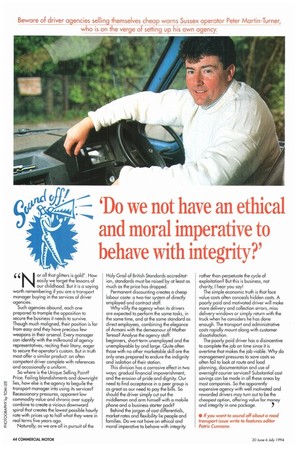'Do we not have an ethical and moral imperative to behave with integrity?'
Page 46

If you've noticed an error in this article please click here to report it so we can fix it.
44 or all that glitters is gold". How
easily we forget the lessons of our childhood. But it is a saying worth remembering if you are a transport manager buying in the services of driver agencies.
Such agencies abound, each one prepared to trample the opposition to secure the business it needs to survive. Though much maligned, their position is far From easy and they have precious few weapons in their arsenal. Every manager can identify with the milkround of agency representatives, reciting their litany, eager to secure the operator's custom. But in truth most offer a similar product: an often competent driver complete with references and occasionally a uniform. So where is the Unique Selling Point? Price. Failing blandishments and downright lies, how else is the agency to beguile the transport manager into using its services? Recessionary pressures, apparent low commodity value and chronic over supply combine to create a vicious downward spiral that creates the lowest possible hourly rate with prices up to half what they were in real terms Five years ago. Naturally, as we are all in pursuit of the Holy Grail of British Standards accreditation, standards must be raised by at least as much as the price has dropped. Permanent discounting creates a cheap labour caste: a Iwo-tier system of directly employed and contract staff. Why vilify the agency when its drivers are expected to perform the some tasks, in the same time, and at the same standard as direct employees, combining the elegance of Armani with the demeanour of Mother Teresa? Analyse the agency staff: beginners, short-term unemployed and the unemployable by and large. Quite often those with no other marketable skill are the only ones prepared to endure the indignity and isolation of their station.
This division has a corrosive effect in two ways: gradual Financial impoverishment, and the erosion of pride and dignity. Our need to find acceptance in a peer group is as great as our need to pay the bills. So should the driver simply cut out the middleman and arm himself with a mobile phone and a business starter pack? Behind the jargon of cost differentials, market rates and flexibility lie people and families. Do we not have an ethical and moral imperative to behave with integrity rather than perpetuate the cycle of exploitation? But this is business, not charity, I hear you say! The simple economic truth is that face value costs often conceals hidden costs. A poorly paid and motivated driver will make more delivery and collection errors, miss delivery windows or simply return with the truck when he considers he has done enough. The transport and administrative costs rapidly mount along with customer dissatisfaction.
The poorly paid driver has a disincentive to complete the job on time since it is overtime that makes the job viable. Why do management pressures to save costs so often fail to look at route and load planning, documentation and use of overnight courier services? Substantial cost savings can be made in all these areas by most companies. So the apparently expensive agency with well motivated and rewarded drivers may turn out to be the cheapest option, offering value for money and integrity in one package.
• If you want to sound off about a road transport issue write to features editor Patric Cunnane.
























































































